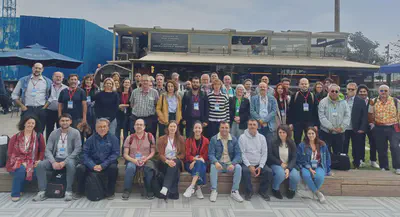Prof. Silvia Giordani presented our research on multilayer fullerenes at the 2nd COST NanoSpace Joint Scientific Meeting at BAU university in Istanbul.
 Prof. Silvia Giordani presenting at the NanoSpace 2nd JSM
Prof. Silvia Giordani presenting at the NanoSpace 2nd JSMChemical functionalization of Multilayers fullerenes (Carbon nano-onions) for biomedical applications
In this presentation, multilayers fullerenes, also known as carbon nano-onions (CNOs), will be discussed as a potential vesicle for nanocarrier-type drug delivery systems [1]. CNOs, or multi-layer fullerenes, consist of multiple concentric layers of sp2 hybridized carbon and are emerging as platforms for biomedical applications because of their ability to be internalized by cells and low toxicity [2].
In my research group we have developed methodology for the synthesis of pure, monodispersed CNOs and various chemical functionalization strategies for the introduction of different functionalities (receptor targeting unit and imaging unit) onto the surface of the CNOs. The modified CNOs display high brightness and photostability in aqueous solutions and are selectively taken up by different cancer cell lines without significant cytotoxicity. Supramolecular functionalization with biocompatible polymers is an effective strategy to develop engineered drug carriers for targeted delivery applications. We reported the use of a hyaluronic acid-phospholipid (HA-DMPE) conjugate to target CD44 overexpressing cancer cells, while enhancing solubility of the nanoconstruct. Non-covalently functionalized CNOs with HA-DMPE show excellent in vitro cell viability in human breast carcinoma cells overexpressing CD44 and are uptaken to a greater extent compared to human ovarian carcinoma cells with an undetectable amount of CD44. In addition, they possess high in vivo biocompatibility in zebrafish during the different stages of development suggesting a high degree of biosafety of this class of nanomaterials [3]. Our results encouraged us to further develop them as targeted diagnostics or therapeutics nanocarriers. We successfully loaded the CNO-based nanocarrier with chemotherapeutic prodrugs derived from gemcitabine, and showed remarkable efficacy in killing pancreatic adenocarcinoma cells [4].
References
[1] M. Bartkowski and S. Giordani, Dalton Transactions, 50, 23 (2021)
[2] S. Giordani et al. Current Medicinal Chemistry, 26, 6915 (2019)
[3] d’Amora M. et al. Colloids and Surfaces B: Biointerfaces, 110779 (2020)
[4] Bartkowski M. et al. Journal of Colloid and Interface Science, 659, 339 (2024)
Organisers, Speakers and Participants

NanoSpace 2nd Joint Scientific Meeting - Link
Book of Abstracts - Link